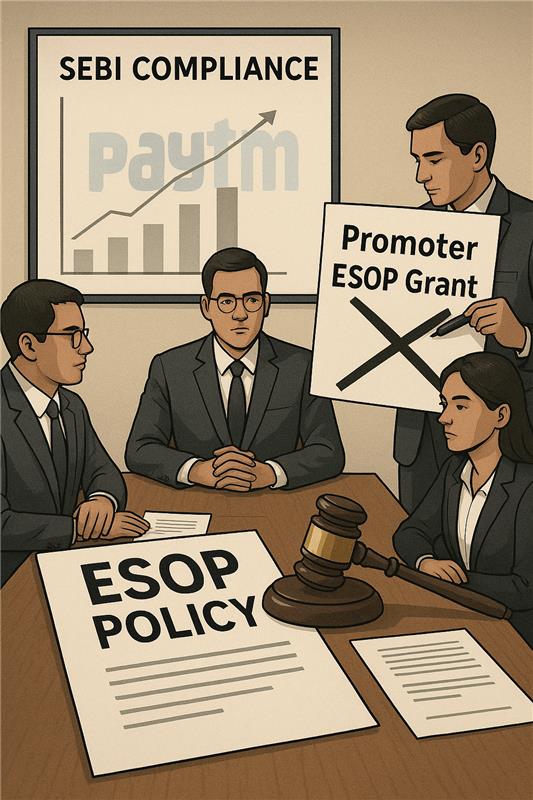Employment contract is an agreement entered into between an employer and an employee that sets up an employer’s and employee’s rights, duties, and obligations towards each other. An employment contract typically includes information regarding salaries, benefits, working hours, leaves and employee’s role and responsibilities towards the employer. An employment agreement assists employees in understanding the work level expectations and standards they are required to fulfil while at work and lay down a pathway of building a legal and valid employer-employee relationship.
Early stage business owners are specially advised to not rely on the offer letter alone and ensure that they execute an employment agreement with each of their employees which will help them preserve their business interests.
This article aims to give an overview of crucial clauses of the agreement including duties and responsibilities, period of probation, confidentiality, intellectual property rights and non-competition as well as solicitation.
- Specific Terms of Employment: These clauses mostly capture the specific terms of the engagement of the employee. For instance, the role for which the employee has been appointed, the compensation/salary payable to the employee, the location of work, the commencement date of engagement, the nature of engagement. The nature of engagement may be on a part-time or full-time basis and/or exclusive. Such an exclusivity clause will incorporate the responsibility of the employee to not engage in any other role (in any capacity whatsoever) with any other person, while in engagement with the employer. It is to be noted that such a restriction may only apply on full time workers and not part time. Below is the suggestive language for this clause:
“While in the full-time employment of the Employer, the Employee shall not be, directly or indirectly, employed, engaged, concerned or interested in any manner whatsoever in any other organization on a permanent, temporary or part-time basis or offer his/her services, with or without consideration to any person, legal entity or public authority or be occupied in one’s own business, without the prior written consent of the Employer.”
- Duties and Responsibilities: In an employment contract, it is important to spell out the role and responsibility of the employee. This clause helps in outlining the scope of work that has to be performed by the employee during his/her engagement with the employer. Such clauses may be general in nature so as to cover the fact that the performance of work shall be done diligently, faithfully, efficiently and competently. In case of special hiring situation, such duties and responsibilities may be specified in a separate annexure. Below is the suggestive language for this clause:
“During the term of the employment, the Employee shall be responsible for performing the duties as described in Annexure A attached hereto. The Employee agrees that he/she will serve the Employer faithfully and to the best of his/her ability and adhere to the parameters, policies, rules and regulations of the Company, from time to time.”
- Period of Probation: A probation period is a period of time, at the beginning of an employment, wherein the employee’s performance is closely assessed and evaluated by the employer and based on which the employer decides to continue the employee’s engagement. This period typically ranges between 3 months to 6 months from the date of joining. During or at the end of this period, if the employee fails to perform to the satisfaction of the employer, the employer may either choose to terminate the employee’s employment or extend the probation period. Below is the suggestive language for this clause:
“It is understood and agreed by the Parties, that the first [90 (Ninety)] days of employment from the date of joining shall constitute a probationary period (“Probation Period”). During or upon expiry (as the case may be) of the Probation Period, if the Employee’s performance is found satisfactory, his/her employment may be confirmed by the Employer in writing. However, if the Employee’s performance is found unsatisfactory to the Employer, at the sole discretion of the Employer, the Employer shall have the right to either extend the Probation Period for such time as the Employer deems fit or terminate the Agreement by providing a prior written notice of [15 (Fifteen)] days to the Employee.”
- Confidentiality: During an employment, crucial information is shared by the employer with the employee and if such information is leaked, the employer may suffer huge losses. This clause is included in the agreement to ensure that the confidential information of the employer remains safe and secure, while at the possession of the employee. The purpose of confidentiality related clause is to prevent the employee from disclosing sensitive information to third parties. Along with this clause, it is imperative to add a survival clause so as to ensure that even if the employment agreement is terminated, this requirement survives and continues to bind the employee. Below is the suggestive language for this clause, however, it is to be noted that confidentiality related clauses shall be captured comprehensively and the below clause may not capture all the necessary elements:
“The Employee acknowledges that, in the course of performing and fulfilling his/her duties hereunder, he/she may have access to and be entrusted with confidential information of the Employer including without limitation business, technical, financial or any information disclosed by the Employer, either directly or indirectly, in whatever form (“Confidential Information”). The Employee shall be responsible for the safe and proper custody of the Confidential Information and agrees that he/she shall not share the Confidential Information with any third party and shall use it only for the purpose of performing his/her services under this Agreement. Upon termination, the Employee shall forthwith return all the Confidential Information to the Employer. All of the Employee’s confidentiality obligations under this Agreement shall survive termination of this Agreement in perpetuity.”
- Intellectual Property Rights: Intellectual property rights related clauses in employment contracts are a common technique for preserving the intellectual property rights of the employer. In special technical hiring situations, the employee may also be asked to declare his/her existing intellectual properties created independently prior to the employment, in order to avoid any future conflicts. To avoid probable infringement, employment contracts should include clauses on ownership and assignment of intellectual property developed by an employee during the term of his/her employment. Below is the suggestive language for this clause:
“The Employee hereby agrees that every intellectual property made, invented, created, developed or discovered by him/her (whether alone or with any third party), during the term of his/her employment with the Employer, shall belong to and be the absolute, sole and exclusive property of the Employer. The Employee agrees to assign, and does hereby irrevocably transfer and assign, to the Employer all of the Employee’s rights, title and interests in and with respect to all such intellectual property.”
- Non-Compete and Non-Solicitation: These restrictive covenants are commonly used by businesses to protect their legitimate commercial interests which include prohibitions on the employee from starting a business that is identical to the employer’s or engaging with any competitor or taking away the employer’s business or clients. The enforceability of such clauses is heavily discussed upon and based on the judicial pronouncements, we can conclude that such negative covenants may be valid and enforceable as long as the restriction is for during the employment period. Post termination, the restriction may be valid if it is for a certain reasonable time or area, however, the enforceability may be decided on a case to case basis. Below is the suggestive language for this clause:
“During the Term of this Agreement and for a period of [1 (One)] year after the termination of this Agreement, the Employee agrees not to, directly or indirectly, (i) engage and/or participate in any capacity whatsoever (including whether as a partner, shareholder, employee, consultant, agent, director) in any activity or business that competes with the business, proposed business or business interests of the Employer, without the Employer’s prior written consent; and (ii) solicit, induce, recruit, take away or divert any employee, business, client, agents, consultant, advisor, representative of the Employer.”
- Termination with and without cause: Most of the employer-employee dispute revolves around termination and therefore it is important that the employment contract spells out the terms around termination clearly. Typically, both the parties have the right of termination for convenience. However, the employer additionally may have a right of termination for cause as well. This simply means for any wrongful acts of the employer, the employee will have an additional right of termination which is more stricter than the general termination right. Below is the suggestive language for this clause:
“This Agreement may be terminated for convenience by either party by providing [1 (One)] months’ prior written notice to the other party. Further, the Employer may terminate this Agreement without any notice or payment in lieu of such notice to the Employee, in case the Employee engages in any negligent, wrongful, unlawful, illegal or fraudulent activity and/or if the Employee misconducts himself/herself and/or the Employee breaches any policies, rules, regulations or the terms of this Agreement.”
Disclaimer: This article is for informational purposes only and shall not be construed as a substitute for legal advice.








